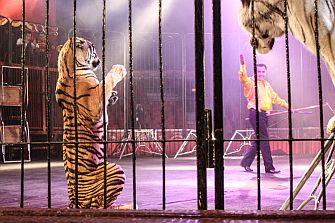The world's oldest continually touring circus called curtains on itself — for good — in rather anticlimactic fashion last Sunday in Mexico City.
The Atayde Hermanos circus, founded in 1888 and playing to audiences all over Mexico ever since, shut down abruptly with a final performance that was only announced that very morning. The closure happened one month sooner than planned, in response to dwindling revenues and shrinking audiences after a citywide ban on the use of animals in circus acts was approved in June.
Opinions were divided over the law, with circus performers protesting in the streets, while animal rights groups welcomed the "progressive step" toward eliminating animal cruelty in Mexico — although other espectáculos públicos, such as bullfighting, are still legal.
The final Atayde Hermanos show took place under a big top off a major thoroughfare in Colonia Portales, a lower middle-class district of Mexico City, 126 years after the first performances in Mexico.
According to Guinness World Records, the Atayde Brothers is the world's oldest touring circus — although it couldn't be confirmed how long that listing will remain valid after this week. Originally, the Atayde circus planned to run its performances in Colonia Portales through October, but circus leaders said government propaganda about the new law was affecting ticket sales.
"There is a tendency in the world to oppose the mistreatment of animals — of course, no one's in favor of that," Federico Serrano, a spokesman for Atayde Hermanos, said after the circus's last act. "In Mexico, it's good politically to attack the most vulnerable sector that works with animals — the circus — and ignore the others where the real mistreatment is."
As he spoke, Serrano waved hellos and goodbyes, accepting brief words of condolences from members of the audience who trickled out after the circus's very last show. For better or for worse, the end of an era had just occurred.
The sparse crowd of ticket-holders entered slowly and was barely able to fill up the front sections of the arena. Families bought cotton candy and popcorn, teenagers and senior citizens posed for pictures with clown mannequins and stuffed tigers, brave children sat atop a posed elephant, creating faint memories of a circus they'll never see again.
 |
The show took off with performer after performer displaying their talents. Acrobats did flips on a giant swing. A clown impersonated Michael Jackson — the less impressive of two Michael Jackson impersonations that evening, the other being that of a tiger.
The first animal trainer who appeared came dressed in a cliché-ridden "Arabic" costume, wearing a turban and leading camels and llamas by whip as they performed formations for the crowd.
"We came because it's the last day," said a man calling himself Carlos, 39, sitting before the show with his daughter Ximena. "I love the circus. I used to come when I was a kid. It's a great tradition, and soon the animals will be gone."
His daughter, 13, disagreed with dad.
"I like the circus; the animals, the acrobats," Ximena said, looking at her father before she continued. "But I think that the law is good, because I feel like the animals suffer."
"It's more a question of politics," her dad countered. "The majority of animals are treated well. It's too bad that instead of trying to solve the problems, they just get rid of it."
The two smiled at their disagreement before settling back into their seats, father and daughter preparing to enjoy the final Atayde show together.
The law banning circus animals was pushed by Mexico's Green Party, a sub-group of the dominant Institutional Revolutionary Party, or PRI, that was nearly expelled by an international coalition of Green parties last year over policy disputes. Similar laws have been passed in nine states across Mexico.
Green Party officials rejected the idea that the law unfairly targeted circuses while permitting bullfights or dolphin shows to continue. The fate of animals currently used in circuses such as the Atayde Hermanos is uncertain.
"This law is specific to the circus because we are working on different laws for bull-fighting and cock-fighting," Fernando Fierro González, a party spokesman, said.
"In the next week or so we'll take the animals, and return them to their natural habitats," he claimed. "The governments of each city will pay for the removal."
Other Green Party officials clarified that the animals may be moved to sanctuaries, to live out the rest of their days without prancing around for humans. But the authors of the law also admitted that the nuts and bolts of what will happen to the animals after the law is fully implemented is itself not yet clear.
 |
"Maybe the animals would be sent to their country, or maybe to a zoo, or maybe a sanctuary. Or even the circus owners could keep them but not use them in the circus. It depends on their papers and what the government says," Green Party spokeswoman Gabriella Gutiérrez said.
That sounded like an inadequate response to César Revollido Guerrero, a horse trainer and the Atayde Hermanos artistic director. After his last performance ever with the circus, he said the government is imposing the law without clearly stating what will happen to the displaced animals.
"The animals are treated even better than the artists here," Revollido Guerrero said. "The performers are looking for different jobs here, maybe different circuses in different countries, but what about the animals?"
In the last Atayde show, 22 animals performed — including one camel, some llamas, and eight horses — and 19 humans, including two children.
Environmentalist leader Gustavo Larios Velasco, president of the Mexican Association for Animal Rights, has independently been trying to connect leaders in Mexico's congress with a British group, Animal Defense International, to organize for the safe care of the Atayde Hermanos animals and those of other circuses in Mexico City.
He said he believes it is possible, but, as of now, nothing has been settled.
"Any law that limits the abuse of animals, whether human or nonhuman, is an example of evolution," Velasco stated. "So the punishment of those who do business and have fun with bondage and exploitation of the defenseless is one step for social consciousness."
The finale of the first act was a horse performance. The horse trainer led a very impressive display of eight horses performing intricate tricks, weaving between each other in military-esque maneuvers.
During the intermission, anticipation grew as the performers, who also doubled as the stagehands, set up a cage around the ring. Without an announcement, the lights dimmed, and La Domador de los Tigres, or "The Tamer of the Tigers," entered leading seven Bengal tigers. He positioned them on platforms with himself in the middle, holding only a whip.
Flores paraded around the ring with his whip as the tigers growled at him and the crowd expected a mauling. Instead, he made them jump through rings of fire, while the others waited for their turns, sitting on platforms obediently.
 |
The tigers that had just performed slept nearby in cages. Light tears came to Julio's eyes when he discussed his connection to the tigers. He'd raised them since they were only a few months old.
"My father was a domador. I grew up with the animals, tigers, lions, and camels. In the circus, jobs are inherited. If your dad is a tamer, you're a tamer. If your dad is an acrobat, you're an acrobat," he told me. "Much like doctors' children are doctors."
To finish, "Thriller" by Michael Jackson came over the loudspeakers. One tiger stood on its hind-legs moving around the ring as Flores led him, mimicking the famous zombie dance. The others remained on their posts, submissive, nearly zombies themselves.
"They're animals and you have to love them, treat them right. But in the end you bought them, you have a receipt," Flores said. "Unfortunately we live in a country where a segment of the population hurts more in their hearts for a tiger or a horse than to see a kid dying of hunger on the street. There's poverty in Mexico, violence. But for Mexicans, that's natural. They don't care when they see a group of thirty human beings without their heads one day, but they go to the circus and watch a tiger up on the stage, and they die of sadness."
Flores was dressed in a glistening yellow shirt and sequined vest, still holding his whip. He never went to school. His life has been dedicated to making tigers submissive to him. Now Flores doesn't know what he's going to do for work, or with his life.
"What happens to us now? The animals? No one knows," Flores went on. "And the government doesn't care."
After the show culminated in a grand finale of numerous acrobats using elephants as gymnastics equipment, all the performers gave their final wave to the crowd. The circus, the whole team, headed backstage for the last time, to the beginning of their new lives.
The audience filed out quietly, heading into the Mexico City night. Their lives probably stayed the same.
"It was a great show and it's sad it's over," Jaime, an audience member, said after the big top emptied. "Is it unfair to the animals? In my opinion, any life spent in a cage is cruel."
Original Story


